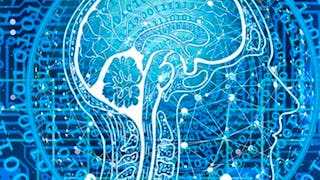Filter by
SubjectRequired
LanguageRequired
The language used throughout the course, in both instruction and assessments.
Learning ProductRequired
LevelRequired
DurationRequired
SkillsRequired
SubtitlesRequired
EducatorRequired
Results for "programming principles"
 Status: Free Trial
Status: Free TrialUniversity of Michigan
Skills you'll gain: Matplotlib, Data Visualization Software, Interactive Data Visualization, Scientific Visualization, Visualization (Computer Graphics), Statistical Visualization, Data Presentation, Graphing, Scatter Plots, Data Manipulation, Histogram, NumPy, Pandas (Python Package)
 Status: Free Trial
Status: Free TrialSkills you'll gain: Data Presentation, Dashboard, Data Storytelling, Data Visualization Software, Microsoft Excel, Spreadsheet Software, Excel Formulas, Graphing, Pivot Tables And Charts, Data Modeling, Databases, Data Analysis, Simulation and Simulation Software
 Status: Free Trial
Status: Free TrialSkills you'll gain: Exploratory Data Analysis, Feature Engineering, Statistical Inference, Data Processing, Data Access, Anomaly Detection, Statistical Analysis, Data Analysis, Data Cleansing, Data Manipulation, Machine Learning, Probability & Statistics, Data Transformation, Workflow Management, Scalability
 Status: Free Trial
Status: Free TrialUniversity of Michigan
Skills you'll gain: Market Data, Loans, Finance, Microsoft Excel, General Finance, Corporate Finance, Mortgage Loans, Financial Analysis, Equities, Investments, Financial Market, Business Valuation, Investment Management, Capital Budgeting, Capital Markets, Financial Forecasting, Financial Modeling, Business Mathematics, Financial Planning, Cash Flows
 Status: Free Trial
Status: Free TrialUniversity of California San Diego
Skills you'll gain: Logical Reasoning, Computational Logic, Deductive Reasoning, Computational Thinking, Theoretical Computer Science, Algorithms, Python Programming, Computer Programming, Computer Science, Program Development
 Status: Free Trial
Status: Free TrialSkills you'll gain: Color Theory, Typography, Design, Graphic and Visual Design Software, Graphic and Visual Design, Design Elements And Principles, Web Content Accessibility Guidelines, Logo Design, Content Creation, Adobe Creative Cloud, Innovation, User Experience Design, Creativity
 Status: Free Trial
Status: Free TrialUniversity of Michigan
Skills you'll gain: Stored Procedure, Database Design, SQL, Relational Databases, NoSQL, PostgreSQL, Database Architecture and Administration, Database Theory, Database Management Systems, Data Modeling, JSON, Scalability, Database Management, Query Languages, Cloud Applications, Data Manipulation, Text Mining, Databases, Data Integrity, Data Import/Export
 Status: NewStatus: Free Trial
Status: NewStatus: Free TrialSkills you'll gain: iOS Development, Apple iOS, Apple Xcode, User Interface (UI), Mobile Development, Swift Programming, Unit Testing, User Interface (UI) Design, UI Components, Mobile Development Tools, Objective-C (Programming Language), Application Development, Data Structures, Programming Principles, Development Testing, Software Testing, Object Oriented Programming (OOP), Software Design Patterns, Integrated Development Environments, Development Environment
 Status: Free Trial
Status: Free TrialUniversity of California, Santa Cruz
Skills you'll gain: Bayesian Statistics, Statistical Inference, Data Analysis, Probability, Statistical Modeling, Statistical Analysis, Microsoft Excel, Probability Distribution, R Programming, Regression Analysis
 Status: Free Trial
Status: Free TrialMultiple educators
Skills you'll gain: Tensorflow, Keras (Neural Network Library), Machine Learning, Google Cloud Platform, Applied Machine Learning, Financial Trading, Reinforcement Learning, Supervised Learning, Data Pipelines, Time Series Analysis and Forecasting, Statistical Machine Learning, Technical Analysis, Deep Learning, Portfolio Management, Machine Learning Methods, Artificial Neural Networks, Market Trend, Securities Trading, Artificial Intelligence and Machine Learning (AI/ML), Financial Market
 Status: Free Trial
Status: Free TrialJohns Hopkins University
Skills you'll gain: Data Manipulation, Data Cleansing, Data Wrangling, Data Integration, Data Quality, Data Transformation, Data Import/Export, Data Collection, Data Management, Web Scraping, Data Access, R Programming, Exploratory Data Analysis, MySQL, File Management, SQL, Application Programming Interface (API)
 Status: Free Trial
Status: Free TrialSkills you'll gain: Anomaly Detection, Image Analysis, Text Mining, Unsupervised Learning, Computer Vision, Artificial Intelligence, Natural Language Processing, Microsoft Azure, Artificial Intelligence and Machine Learning (AI/ML), Applied Machine Learning, Data Ethics, Machine Learning, Large Language Modeling, Regression Analysis, Predictive Modeling, Machine Learning Methods, Statistical Machine Learning, Machine Learning Algorithms, Classification And Regression Tree (CART), Automation
In summary, here are 10 of our most popular programming principles courses
- Applied Plotting, Charting & Data Representation in Python: University of Michigan
- Data Visualization with Advanced Excel: PwC
- Exploratory Data Analysis for Machine Learning: IBM
- Foundational Finance for Strategic Decision Making: University of Michigan
- Mathematical Thinking in Computer Science: University of California San Diego
- Design Fundamentals with AI: Adobe
- PostgreSQL for Everybody: University of Michigan
- Meta iOS UI Development: Meta
- Bayesian Statistics: From Concept to Data Analysis: University of California, Santa Cruz
- Machine Learning for Trading: New York Institute of Finance










